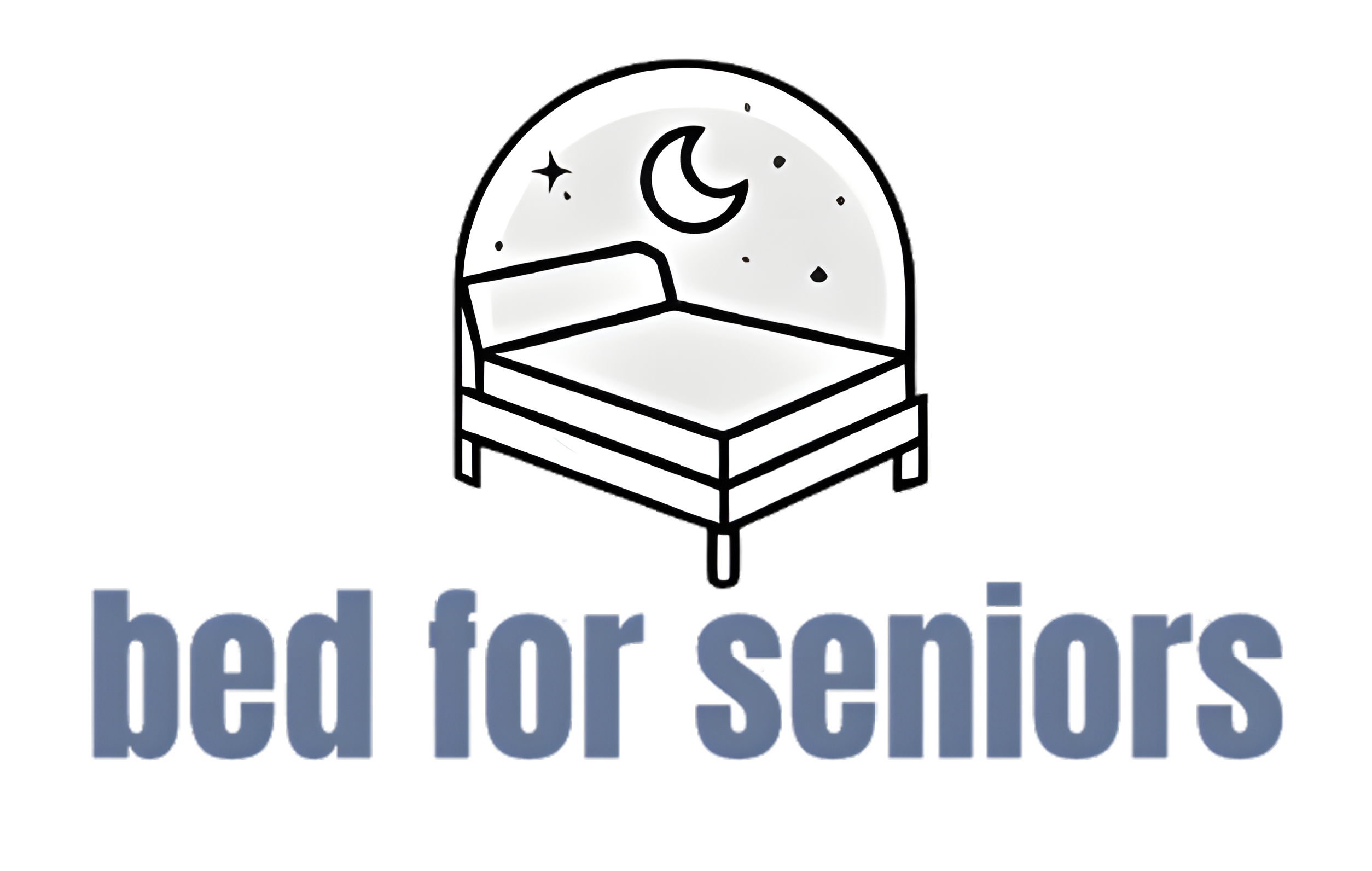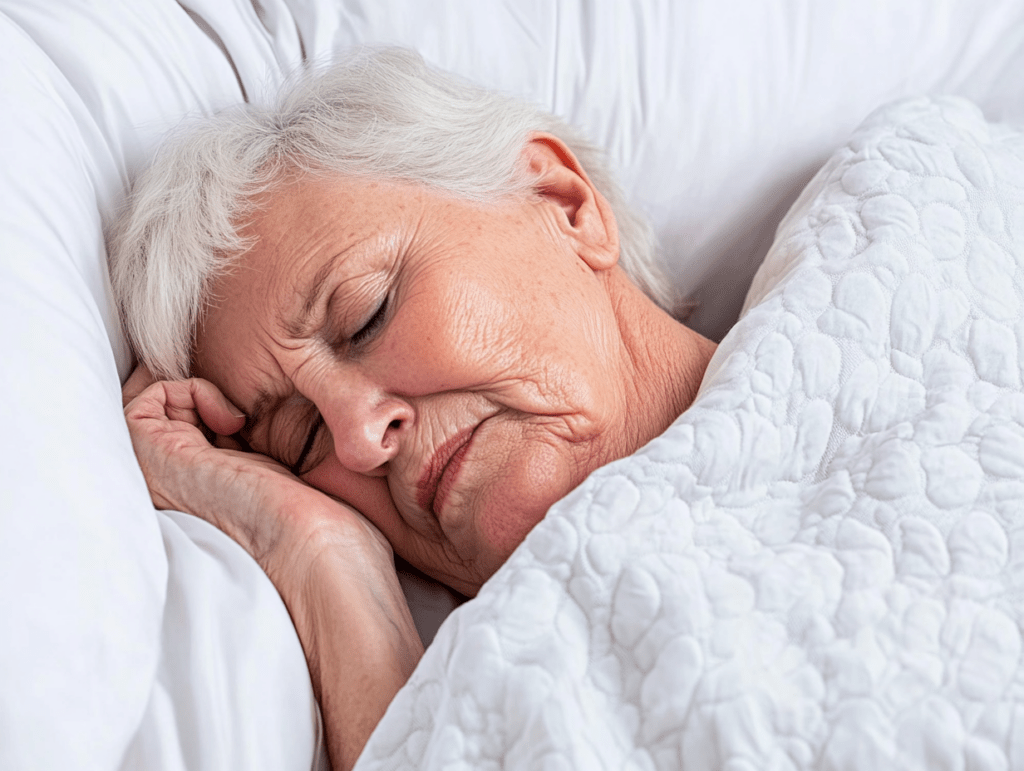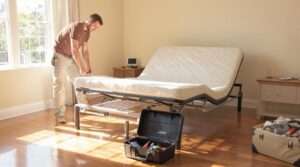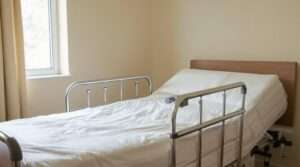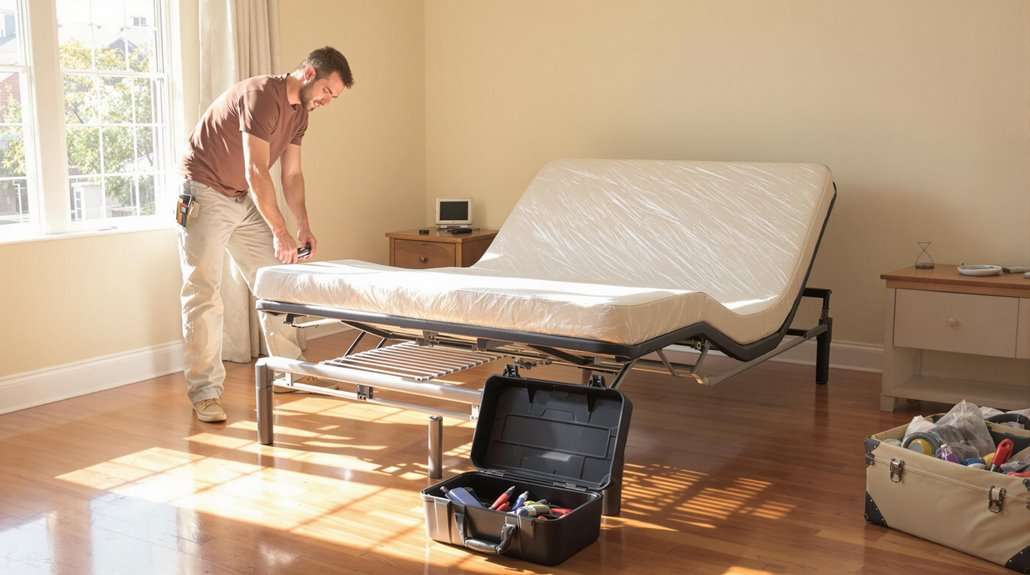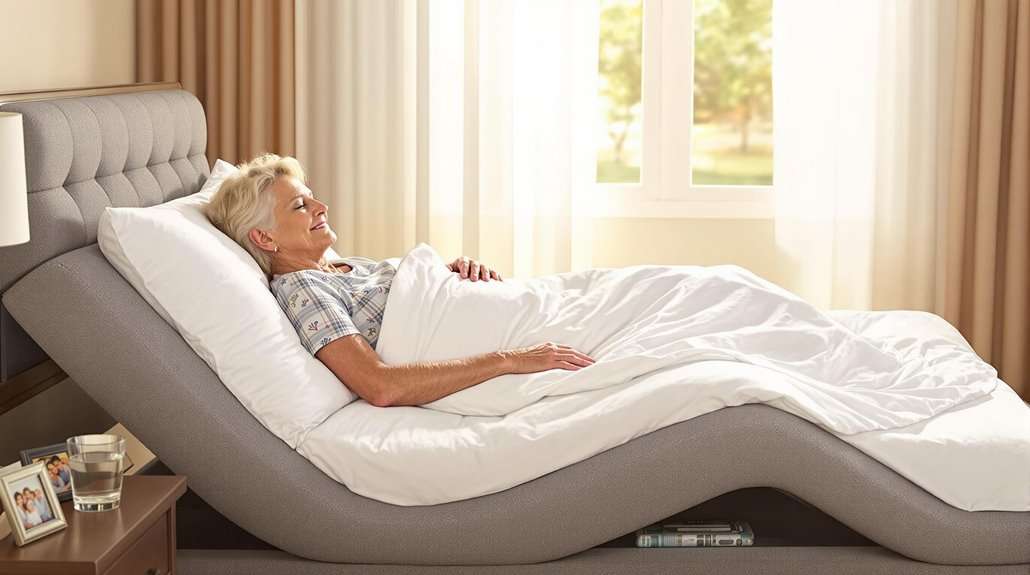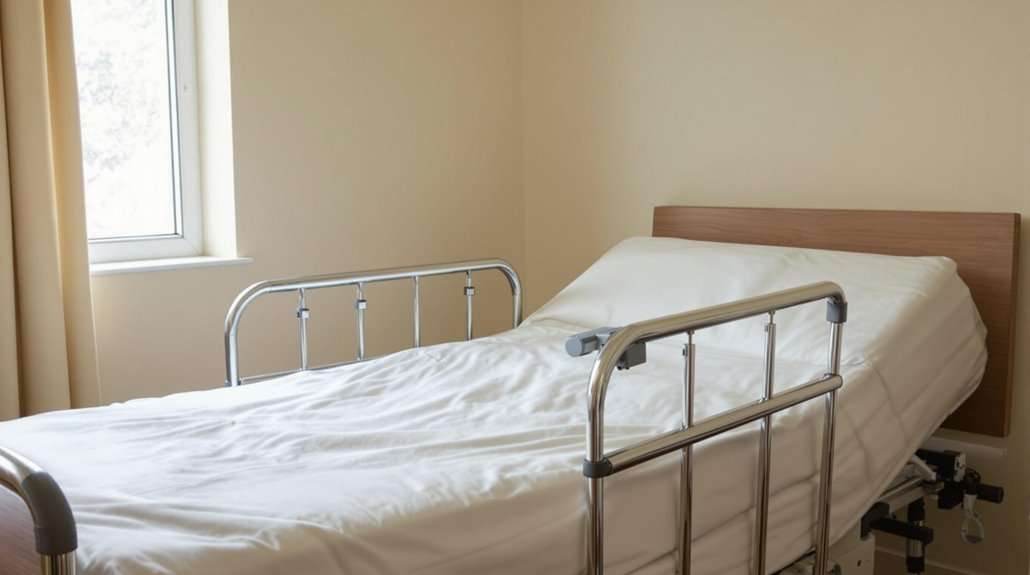As you age, you’re likely to encounter a range of sleep issues that can considerably impact your overall health and quality of life. Common problems include insomnia, characterized by difficulty falling or staying asleep, and sleep apnea, which involves breathing interruptions during sleep. You might also experience restless leg syndrome, frequent nighttime awakenings, or disruptions to your circadian rhythm. Medications can play a role in sleep disturbances as well. It’s important to recognize these issues and seek appropriate help, as addressing sleep problems can greatly improve your well-being. Understanding the specifics of each condition can help you take the first steps towards better sleep.
📋✅
-
Insomnia, characterized by difficulty falling asleep or staying asleep, is prevalent among older adults.
-
Sleep apnea, causing interruptions in breathing during sleep, becomes more common with age.
-
Restless Leg Syndrome (RLS) often disrupts sleep in seniors, causing an urge to move the legs.
-
Frequent nighttime awakenings lead to fragmented sleep and daytime fatigue in older adults.
-
Circadian rhythm disruptions alter sleep-wake cycles, affecting sleep quality and daytime alertness in seniors.
Insomnia in Older Adults
The ticking clock becomes an enemy for many seniors struggling with insomnia. As you age, changes in sleep patterns often occur, making it harder to fall asleep or stay asleep throughout the night. Insomnia in older adults can be particularly frustrating, affecting your overall quality of life and health.
You may find yourself experiencing difficulty initiating sleep, waking up frequently during the night, or rising too early in the morning. These issues can lead to daytime fatigue, irritability, and cognitive impairment. It’s vital to address insomnia promptly, as chronic sleep deprivation can contribute to various health problems.
Improving your sleep hygiene can greatly help combat insomnia. Establish a consistent bedtime routine, create a comfortable sleep environment, and limit screen time before bed. Additionally, stress management techniques such as meditation, deep breathing exercises, or gentle yoga can help calm your mind and prepare your body for rest.
If insomnia persists, don’t hesitate to consult your healthcare provider. They may recommend cognitive behavioral therapy for insomnia (CBT-I) or, in some cases, short-term use of sleep medications. Remember, quality sleep is key for your overall well-being and longevity.
Sleep Apnea and Aging
As you age, your risk of developing sleep apnea increases greatly. This common sleep disorder occurs when your breathing is repeatedly interrupted during sleep, often due to relaxed throat muscles. Sleep apnea symptoms include loud snoring, gasping for air during sleep, morning headaches, and excessive daytime sleepiness. These symptoms can greatly impact your quality of life and overall health.
It’s essential to recognize sleep apnea symptoms in older adults, as they may be mistaken for normal signs of aging. If you suspect you or a loved one might have sleep apnea, consult a healthcare professional for a proper diagnosis. Sleep apnea treatment options vary depending on the severity of the condition. They may include lifestyle changes like weight loss and positional therapy, or medical interventions such as continuous positive airway pressure (CPAP) machines or oral appliances.
Left untreated, sleep apnea can lead to serious health complications, including cardiovascular problems and cognitive decline. By addressing sleep apnea early, you can improve your sleep quality, daytime functioning, and overall well-being. Remember, seeking help for sleep issues is an important step in maintaining your health as you age.
Restless Leg Syndrome
If you’ve ever experienced an irresistible urge to move your legs, especially at night, you might be dealing with Restless Leg Syndrome (RLS). This neurological disorder can greatly impact your sleep quality and overall well-being. As you age, you may be more susceptible to RLS, which often manifests as leg discomfort and an overwhelming need to move your limbs.
To manage RLS and improve your sleep, consider incorporating these strategies into your nightly routines:
- Establish a consistent sleep schedule
- Practice relaxation techniques before bed
- Engage in regular, moderate exercise
- Avoid caffeine and alcohol in the evening
It’s important to note that RLS can be a symptom of underlying health conditions, such as iron deficiency or kidney problems. If you’re experiencing persistent symptoms, consult your healthcare provider for a proper diagnosis and treatment plan. They may recommend lifestyle changes, medications, or supplements to alleviate your discomfort.
Frequent Nighttime Awakenings
While Restless Leg Syndrome can disrupt your sleep, another common issue many seniors face is frequent nighttime awakenings. As you age, you’re more likely to experience multiple awakenings during the night, which can lead to fragmented sleep and daytime fatigue.
These awakenings can be caused by various factors, including changes in your sleep architecture, increased sensitivity to environmental disturbances, and medical conditions. You might find yourself waking up due to noise, light, or temperature changes in your sleep environment. Additionally, conditions like sleep apnea, arthritis pain, or the need to urinate more frequently can contribute to these disruptions.
To address frequent nighttime awakenings, focus on improving your nighttime comfort and optimizing your sleep environment. Ascertain your bedroom is dark, quiet, and at a comfortable temperature. Consider using blackout curtains, white noise machines, or earplugs to minimize disturbances. Invest in a supportive mattress and pillows to reduce discomfort. Establish a consistent bedtime routine and limit fluid intake before bed to reduce the need for nighttime bathroom trips. If awakenings persist, consult your healthcare provider to rule out underlying medical conditions and discuss potential treatments.
Circadian Rhythm Disruptions
Circadian rhythm disruptions are a significant sleep issue for many seniors. As you age, your body’s internal clock can experience circadian shifts, leading to changes in your sleep-wake cycle. These disruptions can result in difficulty falling asleep at night and staying awake during the day. Light exposure plays an essential role in regulating your circadian rhythm, and seniors may not receive adequate natural light, especially if they’re less mobile or spend more time indoors.
To help manage circadian rhythm disruptions, consider these evidence-based strategies:
- Maintain a consistent sleep schedule, even on weekends
- Increase exposure to natural light during the day, particularly in the morning
- Limit artificial light exposure in the evening, especially from electronic devices
- Create a relaxing bedtime routine to signal your body it’s time to sleep
Medication-Induced Sleep Problems
Many seniors face sleep problems as a direct result of their medications. As you care for older adults, it’s vital to understand how certain drugs can affect sleep quality. Some medications have sedative side effects, causing daytime drowsiness, while others may interfere with nighttime sleep patterns.
Common medications that can impact sleep include:
| Medication Type | Sleep-Related Effects |
|---|---|
| Antidepressants | Insomnia or drowsiness |
| Beta-blockers | Nightmares, insomnia |
| Diuretics | Frequent urination |
To address medication-induced sleep problems, you should:
- Review all medications with the senior’s healthcare provider
- Consider adjusting dosages or timing of administration
- Explore alternative medications with fewer sleep-related side effects
It’s essential to balance the therapeutic benefits of medications with their potential impact on sleep quality. Encourage seniors to keep a sleep diary to track how different medications affect their rest. This information can be invaluable when discussing treatment options with their doctor. Remember, never advise seniors to stop or change their medication regimen without professional guidance. By addressing medication-induced sleep issues, you can help improve overall sleep quality and well-being for the seniors in your care.
Frequently Asked Questions
How Does Diet Affect Sleep Quality in Seniors?
Your diet plays an essential role in sleep quality as you age. Nutrient timing is vital; consuming heavy meals close to bedtime can disrupt your sleep. Focusing on sleep-promoting foods like cherries or kiwis may help. Hydration levels also impact sleep; staying well-hydrated throughout the day but limiting fluids before bed can prevent nighttime awakenings. Consider incorporating foods rich in melatonin and tryptophan to support your natural sleep cycle. Always consult your healthcare provider for personalized dietary advice.
Can Specific Exercises Improve Sleep Patterns for Older Adults?
Yes, specific exercises can improve sleep patterns for older adults. You’ll find that incorporating yoga practices and stretching routines into your daily regimen can be particularly beneficial. These activities help relax your muscles, reduce stress, and promote better sleep quality. Regular, gentle exercise can also regulate your body’s circadian rhythm. It’s important to consult with your healthcare provider before starting any new exercise program, ensuring it’s tailored to your individual needs and health conditions.
What Role Does Bedroom Environment Play in Senior Sleep Issues?
Imagine Mrs. Johnson, 78, who struggled with insomnia until she optimized her bedroom. You’ll find that the environment plays a vital role in senior sleep. Lighting adjustments, such as using blackout curtains or dimming lights before bed, can regulate your circadian rhythm. Mattress comfort is equally important; a supportive, pressure-relieving surface can alleviate joint pain and improve sleep quality. By creating a cool, quiet, and comfortable sleep sanctuary, you’re helping seniors achieve more restful nights and better overall health.
Are There Alternative Therapies Effective for Managing Sleep Problems in the Elderly?
Alternative therapies can offer benefits for managing sleep problems in the elderly. You might consider acupuncture, which has shown promising results in improving sleep quality and duration. Its benefits include reducing insomnia symptoms and enhancing overall relaxation. Additionally, aromatherapy effects can be soothing, with lavender and chamomile scents potentially promoting better sleep. While these therapies aren’t a cure-all, they can complement traditional treatments. Always consult with a healthcare provider before incorporating new therapies into your loved one’s sleep routine.
How Does Stress Impact Sleep in Older Individuals?
Stress can greatly disrupt your sleep as an older adult. It increases cortisol levels, making it harder for you to fall asleep and stay asleep. You might experience racing thoughts or anxiety at bedtime. To improve your sleep, focus on stress management techniques like deep breathing, meditation, or gentle yoga. Anxiety reduction strategies, such as journaling or talking with a therapist, can also help. Remember, managing stress isn’t just good for your sleep—it’s beneficial for your overall health and well-being.
